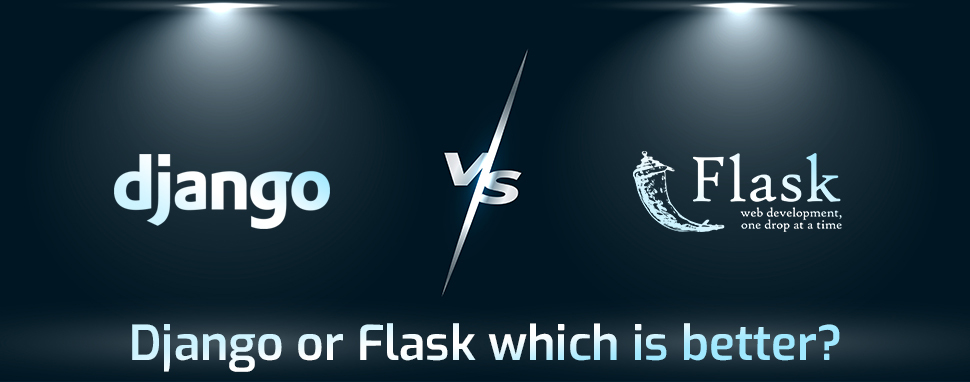
Do you want to choose the best framework for your needs without digging deep? Django vs flask are the two widely used frameworks for Python, Django is a well-polished framework aimed at the rapid development of various web apps written in Python. This framework is distributed as an open-source. The framework itself is actually a code library that helps developers in building reliable, easily scalable, and maintainable web apps. Django is the most popular of a wide variety of frameworks available to Python developers. Certain modules can be replaced yet some core functionality should remain unchanged. It saves a ton of time, money, and effort during development as solutions are straight out of the box.
Django vs Flask for beginners
The development team always opts for Django as it is a solid framework, great for launching apps for everyone from start-ups to big companies. It excels at implementing Python possibilities and offers all the tools needed for sufficient app operations. Whereas Flask works more like a sandbox for developers, where they can hone their skills and quickly test solutions using different modules and libraries.
Django vs Flask Performance
Django
It is a web application framework that has many of the standard functionalities to build secure and maintainable websites. It is a free, opensource and has very active helpful community support with loads of documentation. There are no integration issues as you get most of the things out of the box as one single product.
Features of Django

-
The versatile framework can be used for any website, social network, news site, content management, and more with content in any format like HTML, XML, JSON, and more. It works in tandem with any client-side framework.
Django vs Flask Security
-
Django vs flask security framework is secure and automatically manages standard security features like transaction management, cross-site request forgery; clickjacking, and user account management.
-
It is scalable and maintainable, follows the design, patterns, and principles to reuse and maintain the code. Its main principle of don’t repeat yourself ensures there are no duplications, as it is a component-based framework; each layer is independent of the other, which makes the application scalable at any level. It is portable, written in Python, and the most popular programming language that can run anywhere.
Flask
It is a light-weight framework, popularly categorized as a micro framework. It comes with some standard functionalities and allows developers to add any number of libraries or plugins for an extension. Flask offers flexibility and has a simple, innovative use case to be added to an existing application. It has a small set of easy to learn API and the documentation is excellent. If you are a newbie to Python, start your web development with Flask, so that you can get the feel of backend and front end both as well as learn the core concepts well.
Features of Flask

-
It gives full control of decisions to developers for building an application, during the development implementation stage.
-
It comes with a built-in development server and a fast debugger.
-
Coherent and neat API.
-
Flexible and easy configurations.
-
HTTP and RESTful request handling.
-
Integrated Unit testing support.
-
Werkzeug and Jinja2 provide strong WSGI support and templates.
Comparison between Django and Flask
Django is a full-fledged framework with loads of functionalities, whereas Flask leaves everything under your control. Several differences help you understand which one should you pick for your web application. Here you can have Django vs Flask Performance benchmark
Django
-
Full-stack web framework that follows the batteries included approach.
-
Developers have access to the most common features that make development faster.
-
It comes with a ready to use admin framework that can be customized.
-
It comes with a built-in template engine that saves a lot of development time.
-
It allows the user to divide a single project into multiple small applications that make it easy to develop and maintain.
-
Django admin tool is a built-in bootstrapping tool with which developers can build web applications without any external input.
-
The built-in ORM system enables developers to use any database and perform common DB tasks without having to write long queries.
-
It is a production-ready framework
-
It is more popular as it offers many out of box features and reduces time to build complex applications.
Flask
-
It is a lightweight framework with minimalistic features.
-
Developers can explore and control the core of the application.
-
Administration features can’t be handle by Flask.
-
Flask’s template engine Jinja2 is based on Django
-
Multiple models and views can be added to the single application.
-
Developers have to work with different databases by using ORM systems for Python and SQL Alchemy as the SQL toolkit. SQL queries have to be written for common tasks.
-
It is single-threaded and may not perform too well under heavy load.
-
Flash is a good start for web development and many websites built on the flask have to gain heavy traffic but not as much compared to the ones in Django.
Django or Flask Which Is Better?
-
Flask is great for building simple sites with static content, like blogs, it offers all the functionality you need and allows for customization to a huge extent.
-
Django is perfect for building complex sites with dynamic content, with scalability in mind, big projects that require out of the box solutions can be deployed really fast.
-
Flask is great for developing simple web apps.
-
Django allows deploying more complicated web apps quicker, as its modules are pre configured to offer rapid app development and deployment.
Both Django and Flask are fun to work with, as it gives lots of new stuff to learn.
Please feel free to contact us for a consultation regarding which framework is best for your project, Is it Flask or Django.


